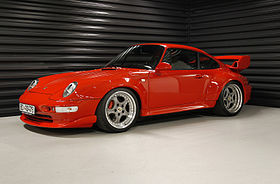Porsche 911 GT2
| Porsche 911 GT2 | |
|---|---|
 |
|
| Overview | |
| Manufacturer | Porsche |
| Production | 1993 – 2012 |
| Assembly | Stuttgart, Baden-Württemberg, Germany |
| Designer |
Pinky Lai Harm Lagaay |
| Body and chassis | |
| Class | Sports car |
| Body style | 2-door coupé |
| Layout | RR layout |
| Related |
Porsche 911 GT3 Porsche 911 Turbo |
| Porsche 993 | |
|---|---|
 |
|
| Overview | |
| Production | 1993-1998 |
| Powertrain | |
| Engine | 3.6L twin-turbocharged H6 |
| Transmission | 6-speed manual |
| Porsche 996 | |
|---|---|
 |
|
| Overview | |
| Production | 2002-2005 |
| Powertrain | |
| Engine | 3,600 cc (220 cu in) H6 |
| Transmission | 6-speed manual |
| Porsche 997 | |
|---|---|
 |
|
| Overview | |
| Production | 2008-2012 |
| Powertrain | |
| Engine | 3,600 cc (220 cu in) H6 |
| Transmission | 6-speed manual |
The Porsche 911 GT2 was a high performance sports car built by the German manufacturer Porsche from 1993 to 2012. It was based on the 911 Turbo, and uses a similar twin-turbocharged engine, but features numerous upgrades, including engine upgrades, larger brakes, and stiffer suspension calibration. The GT2 is significantly lighter than the Turbo due to its use of rear-wheel drive instead of all-wheel drive, and the lightening or removal of interior components. As a result, the GT2 was the most expensive and the highest trim level within the 911 lineup.
The 993-generation GT2 was initially built in order to meet homologation requirements for motorsports. Because the cars were built to meet the GT2 class regulations, the road cars were named accordingly. The 993 GT2 featured widened plastic fenders and a larger rear wing with air scoops in the struts. The 993 GT2's original 3.6 L (220 cu in) engine developed 316 kW (430 PS); in 1998 it was upgraded to 331 kW (450 PS). Fifty-seven road cars were built (seven of which were right-hand drive).
In 1995, this Porsche had a Safety Car in Formula One role, most notably at the Belgian Grand Prix.
In 1999, the 993-generation 911 was replaced with the new 996 model. It would be two years before a new GT2 model would arrive; during that time, Porsche decided to abandon the GT2 for motorsports use, instead concentrating on the new naturally aspirated 911 GT3.
Developed primarily as a road car in contrast to its predecessor, the new GT2 featured a twin-turbocharged version of the GT3's 3.6 L (220 cu in) H6 engine. It featured an output of 462 PS (340 kW), which was later increased to 483 PS (355 kW). Like the 993 GT2, its body differed significantly from those of other 996 variants; major differences included wider fenders, a more aggressively shaped nose, and a large rear wing.
...
Wikipedia
